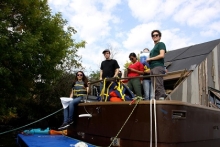Penn Program in Environmental Humanities Partners with Artist on WetLand Sustainability Project

WetLand is both a houseboat and an art project. From October 5 to November 7, 2015, this lab for experimentation in sustainable living will float on the Schuylkill River, piloting cooperative projects among the University of Pennsylvania’s Program in Environmental Humanities (PPEH); Bartram’s Garden; WetLand’s creator, artist Mary Mattingly; and other community collaborators. You are welcome aboard; check social media for #WetLand and #welcomeaboard to visit the floating experiment and get involved!
WetLand is a studio, residence, and open public space that resembles a partly-submerged house. It contains rainwater collection systems, solar energy, a beehive, and edible gardens around its perimeter. Floating on the Lower Schuylkill, amid birdlife and oil refineries, between river paths and the Schuylkill Expressway, WetLand’s voyages are meant to spark conversations about humans and nature, about art, architecture, and ecology, and about the larger question of how we generate knowledge to address the problems we face in an era of warmer temperatures and rising sea level.
A sculptor, Mattingly originally built this watery habitat with funding from the James L. Knight Foundation. During Philadelphia’s Fringe Festival 2014, WetLand was on the Delaware River, where it functioned as a public space and art residency for six weeks. Over 45,000 people visited. One year later, now on the Schuylkill, it provides a platform for hands-on workshops and experimental theatre, for scholars’ symposia and artists’ studios, for fine dining and students’ attempts to live off the grid. Another phase of Schuylkill-based collaboration is in the planning for spring 2016.
Mary Mattingly’s work focuses on themes of human and animal habitation, natural systems, environmental justice and distribution of natural resources. Beginning in childhood, Mattingly has honed an awareness of water pollution, water rights and access from her hometown in Rockville, Connecticut, to privatization issues in Bolivia, to water access in her adopted city of New York. Her work has earned her an array of prizes, media attention, and opportunities to present her messages around the globe.
Among WetLand's 45,000+ visitors last year was Bethany Wiggin, Associate Professor of Germanic Languages and Literatures at Penn Arts and Sciences and co-founder of PPEH. Exploring the boat with Penn students and colleagues, Wiggin saw how it used cutting-edge and ancient technology to make a cozy do-it-yourself home, and how visitors absorbed a new understanding of riverside ecology from its built-in introduction to wetland systems. Mattingly, Wiggin, Penn’s Sustainability Director Dan Garofalo, and Penn students soon decided to establish the PPEHLab at WetLand, creating a floating platform to incubate projects about hope, mourning, ecology, art, health, and community on the Schuylkill. The Lab is now also in partnership with Bartram’s Garden and more extensive programming is in the works.
To learn more about the PPEH Lab at WetLand and how to get involved, click here.





